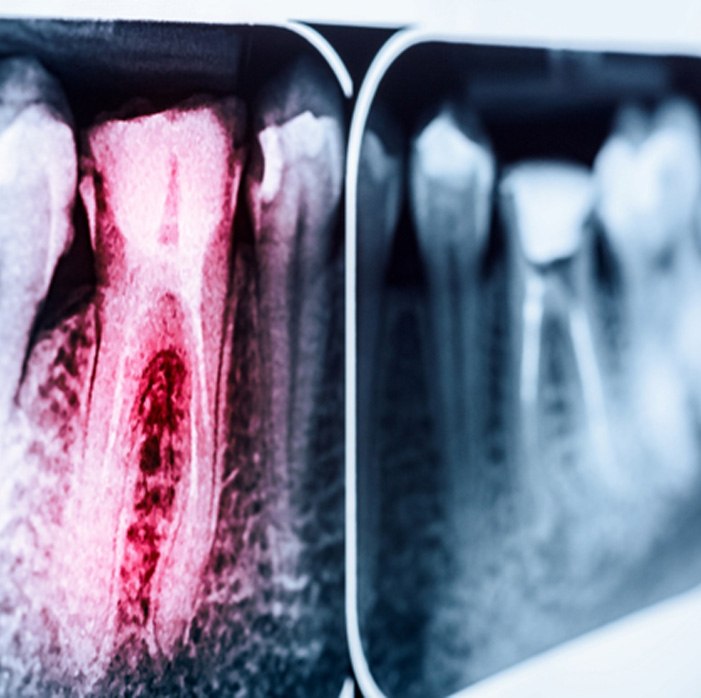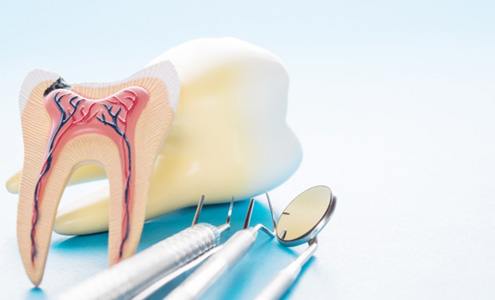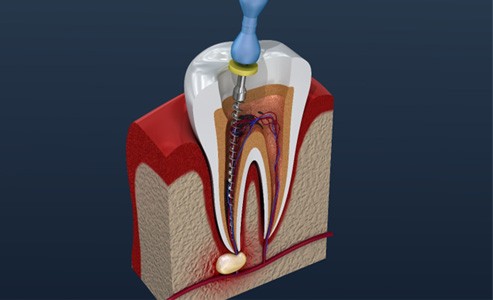Root Canal Therapy – Fort Mill, SC
Straightforward Method for Alleviating Tooth Pain

Are you struggling with a painful toothache that feels like it’s worsening over time? Unlike your other organs, your teeth won’t be able to heal on their own. This means a toothache isn’t going to disappear by itself. Additionally, dental pain can be due to an infection within your tooth, which can result in losing it and infecting the rest of your smile if left untreated. Our team at Southlake Family Dentistry can eliminate toothaches effectively and stop the spread of disease with root canal therapy in Fort Mill. Keep reading or give our office a call today to schedule an appointment!
Why Choose Southlake Family Dentistry for Dental Implants?
- Offers Sedation Dentistry For An Enjoyable Experience
- Utilizes Advanced Dental Technology For Accurate Treatment
- Dedicated Dental Professionals With Many Years Of Experience
Do I Need Root Canal Therapy?

While a toothache may be uncomfortable, not all of them will require root canal therapy to treat. That said, here are several reasons you might need this tooth-saving treatment:
- Tooth sensitivity that persists or lingers for 30 seconds or longer
- A sharp, stabbing discomfort when biting down
- Long-lasting, severe, or worsening tooth pain
- A small, pimple-like bump on your gums
- Discoloration, looseness, or numbness in a tooth
The best way to be certain if you need to undergo root canal therapy is to visit your dentist for an oral examination. However, the longer you wait to address the issue, the higher the likelihood that it will worsen. Be sure to notify our team if you notice any of these symptoms so that we can begin alleviating the problem.
The Root Canal Process

Most people who hear about root canal therapy immediately assume that the treatment involves discomfort. This couldn’t be further from the truth. With modern dental technology, techniques, and effective numbing agents, you shouldn’t have anything to worry about going into the procedure. In fact, most patients report the process feeling no worse than receiving a large filling. More importantly, root canal therapy provides a simple and reliable way to alleviate severe toothaches, eliminating discomfort as soon as possible.
Before starting any work, your dentist will first completely numb your mouth to keep you as comfortable as possible. They’ll then make a small hole in the affected tooth and use special tools to extract the decayed and infected particles. After thoroughly sanitizing the area, they’ll refill it with biocompatible material. While this will seal off the exposed area, our team will likely provide you with a custom-designed dental crown to strengthen and protect your tooth from further complications.
The Benefits of Getting a Root Canal

You can expect to enjoy plenty of essential benefits after undergoing root canal therapy, including:
- Pain-free pearly whites: By removing an infection and eliminating a severe toothache, you’ll be able to return to eating, speaking, and even sleeping comfortably.
- Prevent further serious issues early on: If left untreated, dental infections can result in tooth loss and other systemic health problems. Root canal therapy can put a stop to these complications and help you avoid the burdens that come with tooth extractions.
- Eliminate discomfort when chewing, eating, and drinking
- Improve the look and function of your tooth: Other than restoring the tooth, your custom-made restoration will also rebuild its strength and enhance its appearance.
Root Canal Therapy FAQs

Are you in need of a root canal? You may still have some unanswered questions about the procedure, so we’re here to help! Here are the answers to some of the most common questions we receive about root canal therapy in Fort Mill. If you don’t see the information that you’re looking for below, don’t worry. Give us a call, and we’d be happy to walk you through the treatment process so you know what to expect.
How Long Does It Take to Recover from a Root Canal?
Recovery time differs for everyone, but most patients are able to return to work or school the next day. If your job is physically demanding, you may want to take the next few days off. Vigorous exercise can prolong the healing process by diverting blood from the treatment area. You will likely experience some soreness for a few days, so take your prescribed and over-the-counter medications as directed. Stick to soft foods and chew on the opposite side of your mouth. Brush and floss as normal, but be gentle around your treated tooth.
What Should I Do Before a Root Canal?
In addition to eating a healthy meal and avoiding alcohol before your root canal, stay away from tobacco, as it can interfere with the numbing medication. Most dentists recommend taking over-the-counter pain relievers, like ibuprofen, before your treatment to reduce discomfort as the numbness wears off. Be sure to get a good night’s sleep before your procedure. This can help you to feel less anxious and prepare you for a quick recovery.
How Long Does a Root Canal Take?
In the majority of cases, root canal therapy can be completed in a single appointment. The length of your procedure can take anywhere from 30 to 90 minutes or longer depending on the location of the tooth in the mouth. Molars have more root canals to be disinfected than front teeth. Generally, the farther back your tooth is in your mouth, the longer your root canal will take.
Can I Take Antibiotics Instead of Getting a Root Canal?
Antibiotics are amazing because they can treat bacterial infections in almost every part of the body. However, they don’t work on tooth infections. This is because antibiotics travel through the bloodstream to target infected areas of the body, but the bloodstream cannot reach the pulp of a tooth. Therefore, they cannot eliminate an infection there. If a tooth’s pulp is infected, the only options to treat it are root canal therapy or an extraction.
